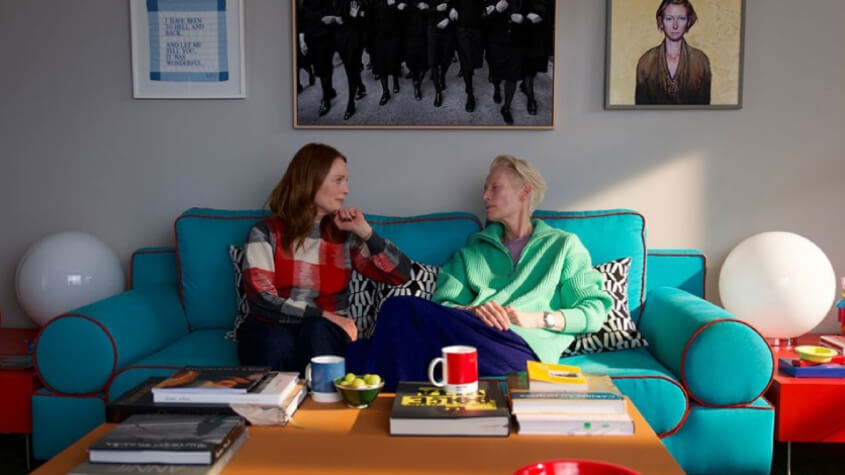Despite their visual vivaciousness, Pedro Almodóvar films have long explored the singular weight of death, albeit with an element of stark levity. Volver follows a woman who is periodically haunted by the smell of her dead mother’s farts, Matador sees a sex scene unfold as an uncanny murder-suicide, and a leg of lamb is used to kill in What Have I Done To Deserve This? Although it doesn’t overtly lean into black comedy, Almodóvar’s latest, The Room Next Door, is perhaps his most death-obsessed film to date.
Almodóvar’s two previous features—Parallel Mothers and Pain and Glory—look at death through a distinctly personal lens, respectively examining the exhumation of mass graves from the Spanish Civil War and the impact of his mother’s death on his creative career. Meanwhile, The Room Next Door employs a light, intimate touch for its meditation on mortality, bolstered by tender yet calculated performances from Julianne Moore and Tilda Swinton. The Spanish maverick’s penchant for melodrama is somewhat off-kilter, but his exquisite eye for color and contrast is decidedly intact, with his lead actresses posing as perfect canvases.
Adapted from Singrid Nunez’s 2020 novel What Are You Going Through, Almodóvar’s English-language feature debut homes in on and fleshes out a specific plot point of the American author’s sprawling, anecdote-riddled narrative. Moore plays Ingrid, a successful writer who’s arrived back in New York City after an extended stint in Europe. While signing her latest novel at Rizzoli in Midtown, an old friend approaches Ingrid to let her know that Martha (Swinton), a war journalist who they used to be quite close to, was recently diagnosed with Stage III cervical cancer. Though she hasn’t seen or heard from Martha in years, Ingrid promptly resolves to visit her in the hospital.
Moore enters what, for Almodóvar, is an appropriately aesthetic cancer ward. She sports a gorgeous plum lip that is perfectly complemented by her ginger locks and rich blue eyes. Her outfit is composed of even more reds and blues, with a dark burgundy coat and deep navy handbag rounding the look into a perfectly poised New York fashion moment. The vibrant tapestry continues unfolding as we encounter Swinton, herself clad in bold primary colors that classically evoke the director’s iconic palette. Brighter still are the flowers that fill classy vases and tasteful accent chairs carefully placed in the room’s periphery. As Martha explains that her cancer is inoperable and she’ll need to undergo an experimental treatment, pink snowflakes begin to fall from a periwinkle sky, twinkling with the illumination of a perfectly-framed Manhattan skyline.
Though they may have lost touch for an extended period of time, Ingrid and Martha naturally fall back into the rhythm of close friendship. It doesn’t appear that this solely stems from a place of guilt for Ingrid, who assumes the role of an attentive caretaker with ease. Maybe this is what causes Martha to run an audacious request by her, one that directly influences the film’s location-specific title. Ingrid nervously sits with the idea as the two sip coffees in Alice Tully Hall (which, although contemporaneously-set, is erroneously presented as part of the formerly-titled Film Society of Lincoln Center), in what is arguably one of the only scenes that feels tethered to New York. The rest of the film, which unfolds at a posh, mid-century modern rental “near Woodstock” in New York’s Hudson Valley, was almost certainly filmed in the director’s beloved Madrid.
While there’s nothing wrong with shooting one location for another, the fact that New York as a setting seems far removed from The Room Next Door is slightly disappointing for a filmmaker who’s made a career of capturing urban sprawls in his native Spain. Obviously, it makes perfect sense to choose an American setting, considering the reference point of Nunez’s novel and the Anglophone actors Almodóvar sought to work with. Then again, even if the presence of the Empire State was palpable, there would still be a dissonance between the director’s melodramatic leanings and their English-language execution. In Spanish, this soapy sensibility is effectively embraced, but these same scenarios and dialogue carry a connotation of corniness in translation. One particular flashback sequence, which centers on a burning barn on the side of a desolate road, reads as particularly cloying in its execution. Overall, though, the scene’s perceived cringeworthiness speaks more to an American barometer for mawkishness (or lack thereof) than any sense of heavy-handedness on the filmmaker’s part.
Stunning in all elements of design and performance, The Room Next Door is another wonderful entry among Almodóvar’s filmography, even if it doesn’t rank among his strongest works. Particularly when his past two features radically re-focus his attention to aspects of his past—both personal and political—this film simply doesn’t measure up in terms of narrative intrepidness. Even in his proper English-language debut, the 2020 short The Human Voice (which also stars Swinton), the filmmaker looked to playwright Jean Cocteau in order to deconstruct his own stylistic motifs. The Room Next Door, by contrast, feels beholden to popular notions of Almodóvar’s visual flair, which keep it from rising to its full potential. Winner of the Golden Lion at this year’s Venice Film Festival—when more ambitious films were also vying for the top prize—it’s almost as if the director is being awarded for remaining true to form. This is quite the shame when his previous offerings have pushed the personal boundaries of an already dynamic artist; hopefully his twenty-fourth feature falls back in line with his recent streak of experimentation.
This review originally ran on September 12, 2024 alongside the film’s Toronto International Film Festival premiere.
Director: Pedro Almodóvar
Writer: Pedro Almodóvar
Starring: Tilda Swinton, Julianne Moore, John Turturro, Alessandro Nivola
Release Date: December 20, 2024
